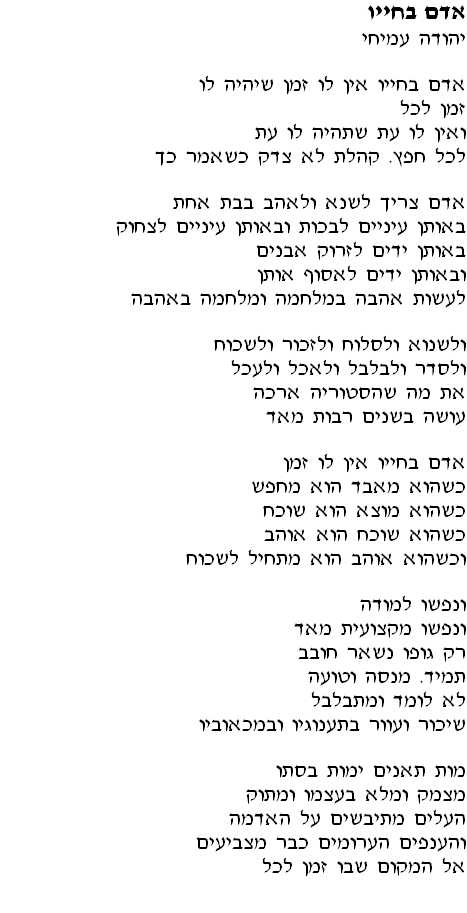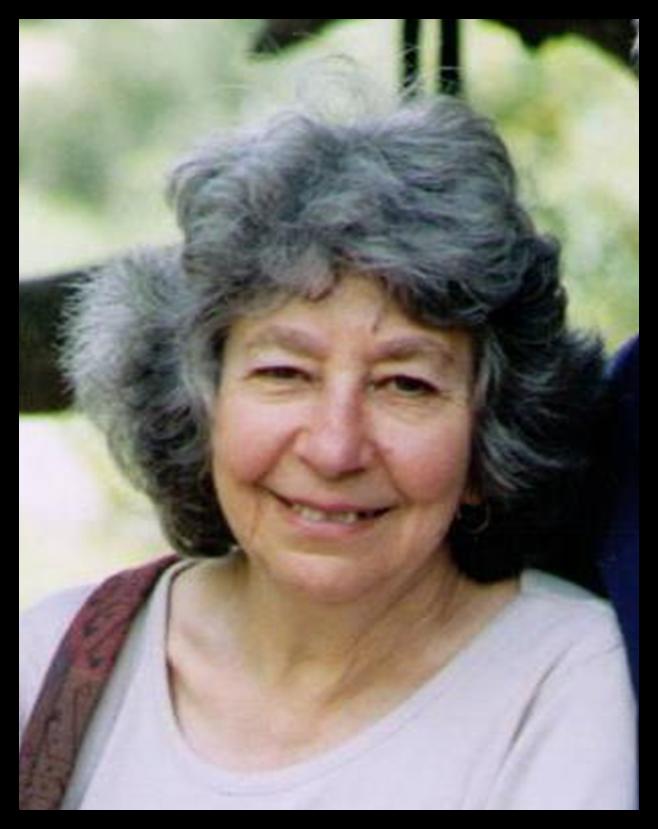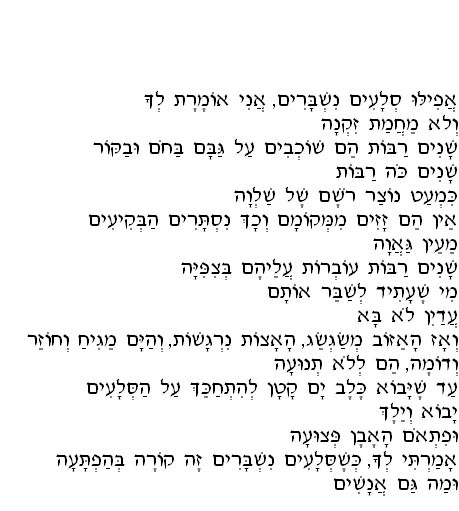Readings for Shirley Seligman
A Man Doesn't Have Time
Yehuda Amichai
A man doesn't have time
to have time for everything.
He doesn't have seasons enough to have
a season for every purpose. Ecclesiastes
was wrong about that.
A man needs to love and to hate at the same moment,
to laugh and cry with the same eyes,
with the same hands to cast away stones and to gather them,
to make love in war and war in love.
And to hate and forgive and remember and forget,
to set in order and confuse, to eat and to digest
what history
takes years and years to do.
A man doesn't have time
When he loses he seeks, when he finds
he forgets, when he forgets he loves, when he loves
he begins to forget.
And his soul is experienced, his soul
is very professional.
Only his body remains forever
an amateur. It tires and it misses,
gets muddled, doesn't learn a thing,
drunk and blind in its pleasures
and in its pains.
He will die as figs die in autumn,
shrivelled and full of himself and sweet,
the leaves growing dry on the ground,
the bare branches already pointing to the place
where there's time for everything.
(Translated from the Hebrew by Chana Bloch)
Yehuda Amichai
A man doesn't have time
to have time for everything.
He doesn't have seasons enough to have
a season for every purpose. Ecclesiastes
was wrong about that.
A man needs to love and to hate at the same moment,
to laugh and cry with the same eyes,
with the same hands to cast away stones and to gather them,
to make love in war and war in love.
And to hate and forgive and remember and forget,
to set in order and confuse, to eat and to digest
what history
takes years and years to do.
A man doesn't have time
When he loses he seeks, when he finds
he forgets, when he forgets he loves, when he loves
he begins to forget.
And his soul is experienced, his soul
is very professional.
Only his body remains forever
an amateur. It tires and it misses,
gets muddled, doesn't learn a thing,
drunk and blind in its pleasures
and in its pains.
He will die as figs die in autumn,
shrivelled and full of himself and sweet,
the leaves growing dry on the ground,
the bare branches already pointing to the place
where there's time for everything.
(Translated from the Hebrew by Chana Bloch)

.
.
.
.
.
.
.
.
,
,
,
,
,
,
Sonnet - To My Mother
Heinrich Heine
Thee had I once in a mad dream forsaken,
And then I longed to roam the wide world over
To see, perchance, if I might Love discover,
And, with embraces loving, Love awaken!
I made my search for Love thro' all the ways,
Before each door with outstretched hands implored,
Like any beggar, alms from Love's rich hoard.
Men sneered, and froze me with their scornful gaze,
But in my love-search never ceasing, ever
For Love, still Love, I sought and found it never;
Then turning once more homeward, sick with care,
Thou didst come forth to meet me-was I dreaming?
For oh, behold! in thy deep eyes lay gleaming
Love, the long sought-for sweetest Love, was there.
(Translated from German by T. Brookbank)
Heinrich Heine
Thee had I once in a mad dream forsaken,
And then I longed to roam the wide world over
To see, perchance, if I might Love discover,
And, with embraces loving, Love awaken!
I made my search for Love thro' all the ways,
Before each door with outstretched hands implored,
Like any beggar, alms from Love's rich hoard.
Men sneered, and froze me with their scornful gaze,
But in my love-search never ceasing, ever
For Love, still Love, I sought and found it never;
Then turning once more homeward, sick with care,
Thou didst come forth to meet me-was I dreaming?
For oh, behold! in thy deep eyes lay gleaming
Love, the long sought-for sweetest Love, was there.
(Translated from German by T. Brookbank)
An meine Mutter
Heinrich Heine
Im tollen Wahn hatt ich dich einst verlassen,
Ich wollte gehn die ganze Welt zu Ende,
Und wollte sehn, ob ich die Liebe fande,
Um liebevoll die Liebe zu umfassen.
Die Liebe suchte ich auf allen Gassen,
Vor jeder Ture streckt ich aus die Hande,
Und bettelte um g'ringe Liebesspende -
Doch lachend gab man mir nur kaltes Hassen.
Und immer irrte ich nach Liebe, immer
Nach Liebe, doch die Liebe fand ich nimmer,
Und kehrte um nach Hause, krank und trube.
Doch da bist du entgegen mir gekommen,
Und ach! was da in deinem Aug' geschwommen,
Das war die susse, langgesuchte Liebe.
Heinrich Heine
Im tollen Wahn hatt ich dich einst verlassen,
Ich wollte gehn die ganze Welt zu Ende,
Und wollte sehn, ob ich die Liebe fande,
Um liebevoll die Liebe zu umfassen.
Die Liebe suchte ich auf allen Gassen,
Vor jeder Ture streckt ich aus die Hande,
Und bettelte um g'ringe Liebesspende -
Doch lachend gab man mir nur kaltes Hassen.
Und immer irrte ich nach Liebe, immer
Nach Liebe, doch die Liebe fand ich nimmer,
Und kehrte um nach Hause, krank und trube.
Doch da bist du entgegen mir gekommen,
Und ach! was da in deinem Aug' geschwommen,
Das war die susse, langgesuchte Liebe.
.
.
.
.
.
.
.
.
.
.
Copyright © 2009 Jon Seligman. All Rights Reserved.

Pride
Dahlia Ravikovitch
Even rocks crack, I'm telling you,
and not on account of age.
For years they lie on their backs
in the heat and the cold,
so many years,
it almost creates the illusion of calm.
They don't move, so the cracks stay hidden.
A kind of pride.
Years pass over them as they wait.
Whoever is going to shatter them
hasn't come yet.
And so the moss flourishes, the seaweed
whips around,
the sea bursts forth and rolls back --
and still they seem motionless.
Till a little seal comes to rub up against the rocks,
comes and goes.
And suddenly the rock has an open wound.
I told you, when rocks crack, it comes as a surprise.
All the more so, people.
(Translated from the Hebrew by Chana and Ariel Bloch)
Dahlia Ravikovitch
Even rocks crack, I'm telling you,
and not on account of age.
For years they lie on their backs
in the heat and the cold,
so many years,
it almost creates the illusion of calm.
They don't move, so the cracks stay hidden.
A kind of pride.
Years pass over them as they wait.
Whoever is going to shatter them
hasn't come yet.
And so the moss flourishes, the seaweed
whips around,
the sea bursts forth and rolls back --
and still they seem motionless.
Till a little seal comes to rub up against the rocks,
comes and goes.
And suddenly the rock has an open wound.
I told you, when rocks crack, it comes as a surprise.
All the more so, people.
(Translated from the Hebrew by Chana and Ariel Bloch)

.
.
.
.
.
.
.
.
.
.
.
,
,
,
,

Kaddish, Part 2 For Shirley Seligman
Based on, and plagiarised from, the poem 'Kaddish, Part I' by Allen Ginsberg
Strange now to think of you, while I walk on the sunny pavement of Abu Tor.
Clear summer noon, and I've been up all night, talking,
talking, reading the Kaddish aloud, listening to the Schumann, the beautiful tune - and your memory in my head.
And read Adonais' last triumphant stanzas aloud - wept, realizing how we suffer.
And how Death is that remedy all singers dream of, sing, remember, prophesy as in the Hebrew Anthem, and my own imagination of a withered leaf - at dawn
Dreaming back through life, Your time - and mine accelerating toward Apocalypse,
the final moment - the flower burning in the Day - and what comes after,
like a poem in the dark - escaped back to Oblivion
No more to say, and nothing to weep for but the Beings in the Dream, trapped in its disappearance, sighing, screaming with it, worshipping each other, worshipping the God included in it all longing or inevitability? while it lasts, a Vision anything more?
Death let you out, Death had the Mercy, you're done with your century, done with God, done with the path thru it - Done with your pain.
There, rest. No more suffering for you. I know where you've gone, it's good.
Thee, Heaven, after Death, only One blessed in Nothingness, not light or darkness, Dayless Eternity
Take this, this Psalm, from me, burst from my hand in a day, some of my Time, now given to Nothing - to praise Thee.
Based on, and plagiarised from, the poem 'Kaddish, Part I' by Allen Ginsberg
Strange now to think of you, while I walk on the sunny pavement of Abu Tor.
Clear summer noon, and I've been up all night, talking,
talking, reading the Kaddish aloud, listening to the Schumann, the beautiful tune - and your memory in my head.
And read Adonais' last triumphant stanzas aloud - wept, realizing how we suffer.
And how Death is that remedy all singers dream of, sing, remember, prophesy as in the Hebrew Anthem, and my own imagination of a withered leaf - at dawn
Dreaming back through life, Your time - and mine accelerating toward Apocalypse,
the final moment - the flower burning in the Day - and what comes after,
like a poem in the dark - escaped back to Oblivion
No more to say, and nothing to weep for but the Beings in the Dream, trapped in its disappearance, sighing, screaming with it, worshipping each other, worshipping the God included in it all longing or inevitability? while it lasts, a Vision anything more?
Death let you out, Death had the Mercy, you're done with your century, done with God, done with the path thru it - Done with your pain.
There, rest. No more suffering for you. I know where you've gone, it's good.
Thee, Heaven, after Death, only One blessed in Nothingness, not light or darkness, Dayless Eternity
Take this, this Psalm, from me, burst from my hand in a day, some of my Time, now given to Nothing - to praise Thee.